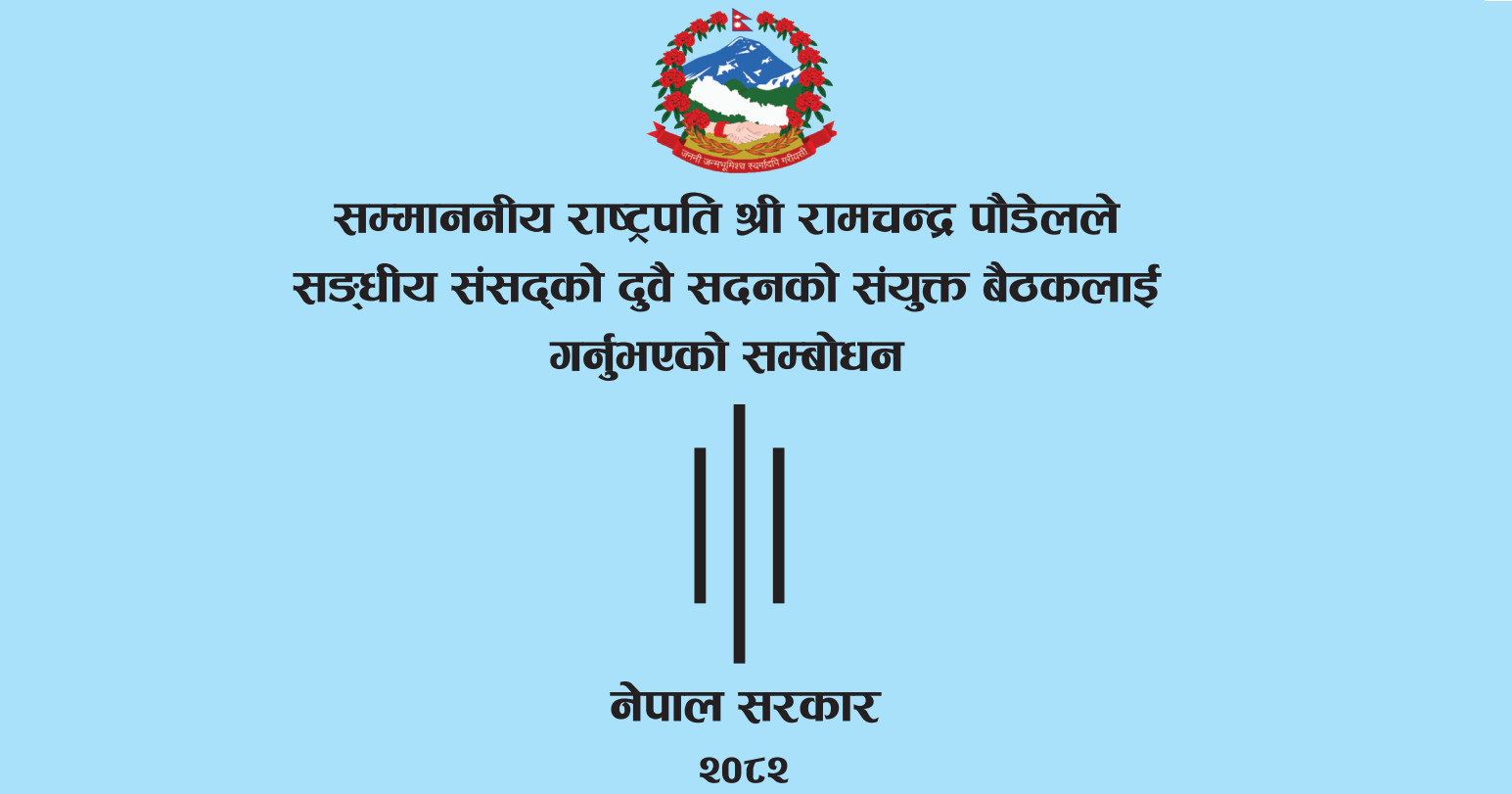
President Presents Policy and Programme for Fiscal Year 2082/83
President Ramchandra Paudel has presented the Policy and Programme for the fiscal year 2082/83.
The announcement was made during a joint session of the House of Representatives and the National Assembly held at the Federal Parliament Building in Baneshwor on Friday.
Focus on Employment Through Entrepreneurship
The government has pledged to generate domestic employment opportunities and increase income avenues through entrepreneurship.
A startup programme will be launched, giving priority to Generation-Z, by integrating business plans with supportive ecosystems.
Integration of Health Services with Insurance
All assistance and subsidy-related health programmes will now be brought under the national health insurance system.
Cricket Stadium to be Upgraded
The cricket ground at Tribhuvan University will be upgraded to meet modern standards.
In addition, the government will provide scholarships for athletes who win international medals and for their children.
Sports Infrastructure and Legal Reforms
Legal provisions will be made to ensure the participation of federal, provincial, and local governments, as well as the private sector, in the construction of sports facilities including stadiums.
The plan includes linking sports with corporate social responsibility programmes of private companies.
Strengthening School Education
The national policy outlines development of technical and vocational education within the school system.
Improving the educational quality of community schools remains a key priority in the government’s programme.
Policies and Programmes in Education:
1. Legal, policy-level, and institutional reforms will be carried out for education reform.
2. The bill prepared to amend and unify the laws related to school education will be passed in this session.
3. Arrangements will be made for all children to receive basic education by 2084.
4. The President's Educational Reform Programme will be revised and strengthened as the National Educational Reform Programme.
5. The existing education system will be directed toward modern science, technology, and research orientation.
6. Based on student grading after completing school education, they will be admitted to technical and vocational as well as university education. The scope of technical education will be extended to the university level.
7. The institutional-community school partnership programme will be implemented to improve the educational quality of community schools with participation from institutional schools. Curricular uniformity will be maintained between institutional and community schools.
8. Intensive training will be arranged based on attractive teaching practices involving virtual learning accessible to all, student counseling systems, interactive e-learning digital platforms, and teacher mentoring.
9. Internships will be used in government service from the local to the central level. Students above the bachelor's level will be involved in various research institutions.
10. A work-study policy will be implemented ensuring a minimum wage for at least 20 hours per week. Residential schools will be opened targeting geographically remote areas.
11. National regulatory standards will be issued for private schools; teacher positions will be reviewed; a teacher bank will be established in collaboration with universities; national qualification standards for teachers will be issued; and responsibilities related to textbooks and meals will gradually be transferred to the provincial governments.
12. Higher education will be made research-based. Governance systems in universities will be improved.
13. National standards for educational quality will be prepared, and learning achievement assessments will be conducted at the local, provincial, and national levels.
14. The university grant system will be revised and distributed based on student numbers, quality, and institutional sustainability. In community campuses, standards will be set for teaching, teacher career development, and promotion, harmonized with other university teachers.
15. A cooperative environment will be developed between the public, private, and educational sectors for scientific research and technological development. All public think tank institutions and research centers will be advanced in a coordinated manner to support policy formulation.
16. Cybersecurity, data protection, app development, and related systems will be advanced through a coordinated approach.
17. Intellectual property, innovation, and research will be linked with traditional knowledge, skills, and communities.
18. Scientific workforce development and research will be institutionalized in coordination with federal, provincial, local governments, and private educational institutions.
19. Radioactive sources that emit radiation, related activities, and mechanisms will be monitored.


